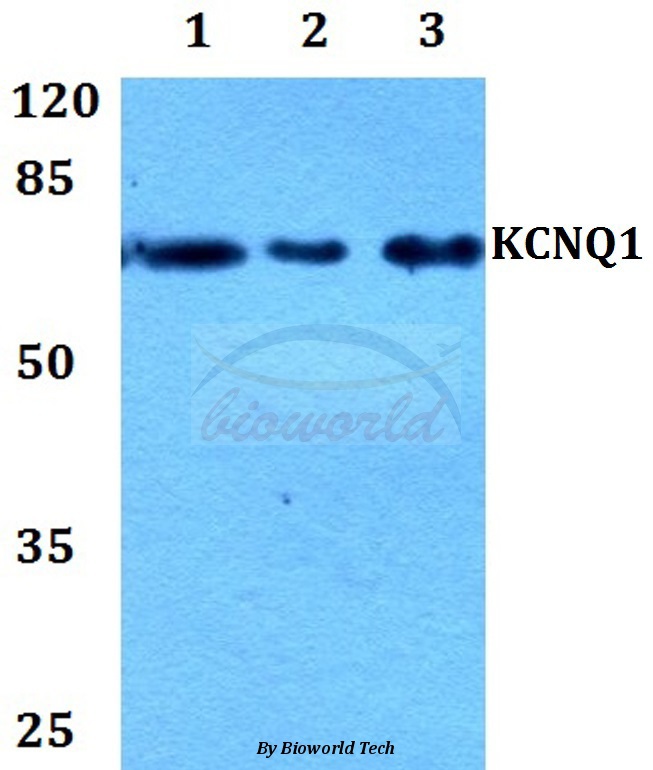Product Name :
Kv7.1 polyclonal antibody Background :
Voltage-gated K+ channels in the plasma membrane control the repolarization and the frequency of action potentials in neurons, muscles and other excitable cells. A specific K+ channel, comprised of an α subunit KCNQ1 and a β subunit KCNE1, a small protein which spans the membrane only once, is predominantly expressed in the heart and in the cochlea, and is responsible for regulating the slow, depolarization-activated potassium current. Mutations in the genes encoding for KCNQ1 and KCNE1 lead to cardiac disease because they directly impair electrical signaling, and mutations in KCNQ4 are implicated in the onset of deafness. KCNQ proteins, including KCNQ1 and KCNQ4, characteristically contain six transmembrane domains and function as tetramers. KCNQ4 forms heteromeric channels with KCNQ3 and is expressed in several tissues, including the cochlea, where it is present in outer hair cells. Product :
Rabbit IgG, 1mg/ml in PBS with 0.02% sodium azide, 50% glycerol, pH7.2 Storage&Stability :
Store at 4°C short term. Aliquot and store at -20°C long term. Avoid freeze-thaw cycles. Specificity :
Kv7.1 polyclonal antibody detects endogenous levels of Kv7.1 protein. Immunogen :
A synthetic peptide corresponding to residues in Human Kv7.1. Conjugate :
Unconjugated Modification :
Unmodification
Kv7.1 polyclonal antibody Background :
Voltage-gated K+ channels in the plasma membrane control the repolarization and the frequency of action potentials in neurons, muscles and other excitable cells. A specific K+ channel, comprised of an α subunit KCNQ1 and a β subunit KCNE1, a small protein which spans the membrane only once, is predominantly expressed in the heart and in the cochlea, and is responsible for regulating the slow, depolarization-activated potassium current. Mutations in the genes encoding for KCNQ1 and KCNE1 lead to cardiac disease because they directly impair electrical signaling, and mutations in KCNQ4 are implicated in the onset of deafness. KCNQ proteins, including KCNQ1 and KCNQ4, characteristically contain six transmembrane domains and function as tetramers. KCNQ4 forms heteromeric channels with KCNQ3 and is expressed in several tissues, including the cochlea, where it is present in outer hair cells. Product :
Rabbit IgG, 1mg/ml in PBS with 0.02% sodium azide, 50% glycerol, pH7.2 Storage&Stability :
Store at 4°C short term. Aliquot and store at -20°C long term. Avoid freeze-thaw cycles. Specificity :
Kv7.1 polyclonal antibody detects endogenous levels of Kv7.1 protein. Immunogen :
A synthetic peptide corresponding to residues in Human Kv7.1. Conjugate :
Unconjugated Modification :
Unmodification
-
 Western blot (WB) analysis of Kv7.1 polyclonal antibody at 1:500 dilution Lane1:DLD whole cell lysate Lane2:Mouse brain tissue lysate Lane3:Rat brain tissue lysate
Western blot (WB) analysis of Kv7.1 polyclonal antibody at 1:500 dilution Lane1:DLD whole cell lysate Lane2:Mouse brain tissue lysate Lane3:Rat brain tissue lysate
Bioworld Biotech only provide peptides for our antibodies and do not provide additional peptide customization services.
Price/Size :
USD 368/1mg/vial
Tips:
For phospho antibody, we provide phospho peptide(0.5mg) and non-phospho peptide(0.5mg).Describe :
Blocking peptides are peptides that bind specifically to the target antibody and block antibody binding. These peptide usually contains the epitope recognized by the antibody. Antibodies bound to the blocking peptide no longer bind to the epitope on the target protein. This mechanism is useful when non-specific binding is an issue, for example, in Western blotting (WB) and Immunohistochemistry (IHC). By comparing the staining from the blocked antibody versus the antibody alone, one can see which staining is specific; Specific binding will be absent from the western blot or IHC performed with the neutralized antibody.Formula:
Synthetic peptide was lyophilized with 100% acetonitrile and is supplied as a powder. Reconstitute with 0.1 ml DI water for a final concentration of 10 mg/ml.The purity is >90%,tested by HPLC and MS.
Storage:
The freeze-dried powder is more stable. For short time at 2-8°C. For long term storage store at -20°C.
Note :
This product is for research use only (RUO only). Not for use in diagnostic or therapeutic procedures.
 Kv7.1 polyclonal antibody
Kv7.1 polyclonal antibody  Datasheet
Datasheet COA
COA MSDS
MSDS SHIP
SHIP